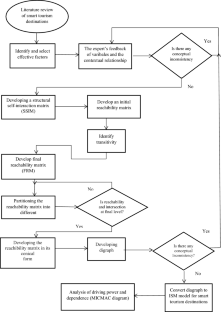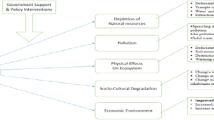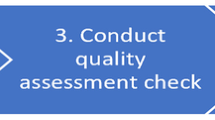Abstract
The smart tourism concept emerged from smart city development and is a particular application area within smart city initiatives. Smart tourism is broadly applied as a strategic tool to enhance the competitiveness of tourism destinations. This study creates a framework to identify, explore, and rate the effective factors of developing smart tourism destinations. The effective factors were identified through a review of the research literature and by surveying experts. The identified factors were rated using an interpretative-structural modelling approach. A Cross-impact matrix multiplication applied to classification (MICMAC) analysis was used to determine the power and dependence of these factors. The findings show 20 indexes at ten levels. Financial resources, government support, and smart tourism policies were identified as the most important factors in modelling smart tourism development. By identifying effective factors for developing smart tourism destinations, the policymakers can encourage innovation of smart destinations, support smart tourism and highlight the multi-faceted contribution of smart destinations to sustainable development.


Similar content being viewed by others
References
Agarwal A, Shankar R, Tiwari M (2007) Modeling agility of supply chain. Ind Mark Manage 36(4):443–457
Alami T, Tahmasebi Aria T (2016) Sustainable and smart destination management: Opportunities for the DMO to act as an intelligent agent among destination stakeholders. (Master thesis), Umeå University, School of Business and Economics
Allam Z, Newman P (2018) Redefining the smart city: culture, metabolism and governance. Smart Cities 1(1):4–25
Álvarez-García J, Río-Rama MdIC, Vázquez-Huerta G, Rueda-Armengot C (2017) Smart city and tourism: an analysis of development of caceres (Spain) as a smart city. In: Peris-Ortiz M, Bennett DR, Pérez-Bustamante Yábar D (eds) Sustainable smart cities: creating spaces for technological, social and business development. Springer International Publishing, Cham, pp 199–218
Attri R, Dev N, Sharma V (2013) Interpretive structural modelling (ISM) approach: an overview. Res J Manage Sci 2(2):3–8
Atzori L, Iera A, Morabito G (2010) The internet of things: a survey. Comput Netw 54(15):2787–2805. https://doi.org/10.1016/j.comnet.2010.05.010
Azar A, Bayat K (2013) Designing a model for" Business process-orientation" using interpretive structural modeling approach (ISM). Afr J Bus Manage 7(26):2558–2569
Beiderbeck D, Frevel N, Heiko A, Schmidt SL, Schweitzer VM (2021) Preparing, conducting, and analyzing Delphi surveys: Cross-disciplinary practices, new directions, and advancements. MethodsX 8:101401
Bhuiyan MAH, Siwar C, Ismail SM (2013) Tourism development in Malaysia from the perspective of development plans. Asian Soc Sci 12(9):11–18
Boes K, Buhalis D, Inversini A (2015) Conceptualising smart tourism destination dimensions. In: Min H (ed) Information and communication technologies in tourism 2015. Springer, Cham, pp 391–403
Boes K, Buhalis D, Inversini A, Morrison A, Gretzel U (2016) Smart tourism destinations: ecosystems for tourism destination competitiveness. Int J Tourism Cities 2(2):108–124. https://doi.org/10.1108/IJTC-12-2015-0032
Bolanos R, Fontela E, Nenclares A, Pastor P (2005) Using interpretive structural modelling in strategic decision-making groups. Manag Decis 43(6):877–895
Briedenhann J, Butts S (2006) Application of the Delphi technique to rural tourism project evaluation. Curr Issue Tour 9(2):171–190
Buhalis D (2000) Tourism and information technologies: past, present and future. Tour Recreat Res 25(1):41–58
Buhalis D (2003) eTourism: information technology for strategic tourism management. Financial Times Prentice-Hall, Pearson
Buhalis D, Amaranggana A (2013) Smart tourism destinations. Information and communication technologies in tourism 2014. Springer, Cham, pp 553–564
Buonincontri P, Micera R (2016) The experience co-creation in smart tourism destinations: a multiple case analysis of European destinations. Info Technol Tourism 16(3):285–315. https://doi.org/10.1007/s40558-016-0060-5
Chatterjee S, Kar AK (2015) Smart Cities in developing economies: a literature review and policy insights. Paper presented at the Advances in Computing, Communications and Informatics (ICACCI), 2015 International Conference on Advances in Computing, Communications and Informatics (ICACCI)), IEEE, Kochi, pp 2335–2340
Chen S, Law R, Xu S, Zhang M (2020) Bibliometric and visualized analysis of mobile technology in tourism. Sustainability 12(19):7975
Dameri RP (2014) Comparing smart and digital city: initiatives and strategies in Amsterdam and Genoa. Are they digital and/or smart? Smart city. Springer, pp 45–88
del Bosque IR, San Martín H (2008) Tourist satisfaction a cognitive-affective model. Ann Tour Res 35(2):551–573
Del Chiappa G, Baggio R (2015) Knowledge transfer in smart tourism destinations: analyzing the effects of a network structure. J Destin Mark Manag 4(3):145–150
Del Vecchio P, Mele G, Ndou V, Secundo G (2017) Creating value from social big data: implications for smart tourism destinations. Inf Process Manage 54(5):847–860
Della Corte V, D’Andrea C, Savastano I, Zamparelli P (2017) Smart cities and destination management: Impacts and opportunities for tourism competitiveness. Eur J Tour Res 17:7–27
Errichiello L, Micera R (2021) A process-based perspective of smart tourism destination governance. Eur J Tour Res 29:2909–2909
Fefer JP, De-Urioste Stone S, Daigle J, Silka L (2016) Using the Delphi technique to identify key elements for effective and sustainable visitor use planning frameworks. SAGE Open 6(2):2158244016643141
Ganchev I, Ji Z, O'Droma M (2014) A generic IoT architecture for smart cities. In: Proceedings of 25th IET Irish signals & systems conference, pp 196–199
Ghaderi Z, Hatamifar P, Henderson JC (2018) Destination selection by smart tourists: the case of Isfahan, Iran. Asia Pacific J Tour Res 23(4):385–394
Godet M (1994) From anticipation to action. UNESCO, Paris
Gossler T, Sigala IF, Wakolbinger T, Buber R (2019) Applying the Delphi method to determine best practices for outsourcing logistics in disaster relief. J Humanitarian Logistics Supply Chain Manag 9(3):438–474
Graziano T (2014) Boosting innovation and development: the Italian Smart Tourism, a critical perspective. Eur J Geogr 5(4):6–18
Gretzel U (2018) From smart destinations to smart tourism regions. Investigaciones Regionales-J Reg Res 42:171–184
Gretzel U, Sigala M, Xiang Z, Koo C (2015a) Smart tourism: foundations and developments. Electron Mark 25(3):179–188. https://doi.org/10.1007/s12525-015-0196-8
Gretzel U, Werthner H, Koo C, Lamsfus C (2015b) Conceptual foundations for understanding smart tourism ecosystems. Comput Hum Behav 50:558–563
Gretzel U, Zhong L, Koo C, Morrison A, Morrison A (2016) Application of smart tourism to cities. Int J Tour Cities 2(2):216–233. https://doi.org/10.1108/IJTC-04-2016-0007
Guo Y, Liu H, Chai Y (2014) The embedding convergence of smart cities and tourism internet of things in China: an advance perspective. Adv Hospitality Tour Res (AHTR) 2(1):54–69
Hsu C-C, Sandford BA (2007) The Delphi technique: making sense of consensus. Pract Assess Res Eval 12(1):10
Huang J-J, Tzeng G-H, Ong C-S (2005) Multidimensional data in multidimensional scaling using the analytic network process. Pattern Recogn Lett 26(6):755–767
Hwang J, Park H-Y, Hunter WC (2015) Constructivism in smart tourism research: Seoul destination image. Asia Pacific J Info Syst 25(1):163–178. https://doi.org/10.14329/apjis.2015.25.1.163
Ivars-Baidal JA, Celdrán-Bernabeu MA, Mazón J-N, Perles-Ivars ÁF (2017) Smart destinations and the evolution of ICTs: a new scenario for destination management? Curr Issues Tour 22(13):1581–1600
Jovicic DZ (2016) Key issues in the conceptualization of tourism destinations. Tour Geogr 18(4):445–457
Jovicic DZ (2017) From the traditional understanding of tourism destination to the smart tourism destination. Curr Issue Tour 18(4):445–457. https://doi.org/10.1080/13683500.2017.1313203
Kaynak E, Bloom J, Leibold M (1994) Using the Delphi technique to predict future tourism potential. Marketing Intell Plann 12(7):18–29
Khan MS, Woo M, Nam K, Chathoth PK (2017) Smart city and smart tourism: a case of Dubai. Sustainability 9(12):2279
Kim D, Kim S (2017) The role of mobile technology in tourism: Patents, articles, news, and mobile tour app reviews. Sustainability 9(11):2082
Koo C, Gretzel U, Hunter WC, Chung N (2015) The role of IT in tourism. Asia Pacific J Info Syst 25(1):99–104
Koo C, Shin S, Gretzel U, Hunter WC, Chung N (2016) Conceptualization of smart tourism destination competitiveness. Asia Pacific J Info Syst 26(4):561–576
Krutwaysho O, Bramwell B (2010) Tourism policy implementation and society. Ann Tour Res 37(3):670–691
Lamsfus C, Martín D, Alzua-Sorzabal A, Torres-Manzanera E (2015) Smart tourism destinations: an extended conception of smart cities focusing on human mobility. Information and communication technologies in tourism 2015. Springer, pp 363–375
Lee CF, King BE (2008) Using the Delphi method to assess the potential of Taiwan’s hot springs tourism sector. Int J Tour Res 10(4):341–352
Lee J, Lee H, Chung N, Koo C (2017) An integrative model of the pursuit of happiness and the role of smart tourism technology: a case of international tourists. Seoul Information and Communication Technologies in Tourism 2017. Springer, pp 173–186
Liberato P, Alen E, Liberato D (2018) Smart tourism destination triggers consumer experience: the case of Porto. Eur J Manag Bus Econ 27(1):6–25
Lim C, Mostafa N, Park J (2017) Digital Omotenashi: toward a smart tourism design systems. Sustainability 9(12):2175
Ling-Yun Z, Nao L, Min L (2012) On the basic concept of smarter tourism and its theoretical system. Tourism Tribune/Lvyou Xuekan 27(5):66–73
Lombardi P, Giordano S, Farouh H, Yousef W (2012) Modelling the smart city performance. Innovation: Eur J Soc Sci Res 25(2):137–149
Mandić A, Kennell J (2021) Smart governance for heritage tourism destinations: contextual factors and destination management organization perspectives. Tour Manag Perspect 39:100862
Mastorakis G, Trihas N, Mavromoustakis CX, Perakakis E, Kopanakis I (2014) A cloud computing model for efficient marketing planning in tourism. Int J Online Marketing (IJOM) 4(3):14–30
Neuhofer B, Buhalis D, Ladkin A (2015) Smart technologies for personalized experiences: a case study in the hospitality domain. Electron Mark 25(3):243–254
OECD (2018) Towards investment and financing for sustainable tourism. OECD tourism trends and policies 2018. OECD Publishing, Paris
OECD (2020) OECD tourism trends and policies 2020. OECD Publishing, Paris
Polese F, Botti A, Grimaldi M, Monda A, Vesci M (2018) Social innovation in smart tourism ecosystems: how technology and institutions shape sustainable value co-creation. Sustainability 10(1):140
Presenza A, Micera R, Splendiani S, Del Chiappa G (2014) Stakeholder e-involvement and participatory tourism planning: analysis of an Italian case study. Int J Knowl-Based Dev 5(3):311–328
Raj T, Attri R (2011) Identification and modelling of barriers in the implementation of TQM. Int J Productivity Qual Manage 8(2):153–179
Ravi V, Shankar R (2005) Analysis of interactions among the barriers of reverse logistics. Technol Forecast Soc Chang 72(8):1011–1029
Ronay E, Egger R (2013) NFC smart city: cities of the future—a scenario technique application. Information and communication technologies in tourism 2014. Springer, pp 565–577
Sage AP (1977) Interpretive structural modeling: methodology for large-scale systems. McGraw-Hil, New York, pp 91–164
Sánchez AV (2016) Exploring the concept of smart tourist destination. Enlightening Tour 2:178–196
Schmalz U, Spinler S, Ringbeck J (2021) Lessons learned from a two-round Delphi-based scenario study. MethodsX 8:101179
Shafiee S, Ghatari AR, Hasanzadeh A, Jahanyan S (2019) Developing a model for sustainable smart tourism destinations: a systematic review. Tour Manage Perspect 31:287–300. https://doi.org/10.1016/j.tmp.2019.06.002
Shafiee S, Ghatari AR, Hasanzadeh A, Jahanyan S (2021) Smart tourism destinations: a systematic review. Tour Rev. https://doi.org/10.1108/TR-06-2019-0235
Su K, Li J, Fu H (2011). Smart city and the applications. Paper presented at the 2011 International Conference on Electronics, Communications and Control (ICECC), Ningbo, China, pp 1028–1031
Sushil S (2012) Interpreting the interpretive structural model. Glob J Flex Syst Manag 13(2):87–106
Tu Q, Liu A (2014) Framework of smart tourism research and related progress in China. Paper presented at the In International conference on management and engineering (CME 2014), Shanghai,China, pp 140–146
Turoff M, Linstone HA (2002) The Delphi method: techniques and applications. Addison-Wesley Publishing Company
Tüzünkan D (2017) The relationship between innovation and tourism: the case of smart tourism. Int J Appl Eng Res 12(23):13861–13867
Vu K, Hartley K (2017) Promoting smart cities in developing countries: policy insights from Vietnam. Telecommun Policy. 42(10):845–859
Wang D, Li XR, Li Y (2013) China’s “smart tourism destination” initiative: a taste of the service-dominant logic. J Destin Mark Manag 2(2):59–61. https://doi.org/10.1016/j.jdmm.2013.05.004
Wang X, Li XR, Zhen F, Zhang J (2016) How smart is your tourist attraction?: Measuring tourist preferences of smart tourism attractions via a FCEM-AHP and IPA approach. Tour Manage 54:309–320
Warified J (1974) Toward interpretation of complex structural modeling. IEEE Trans SMC-4(5):405–417
Xiang Z, Fesenmaier DR (2017) Big data analytics, tourism design and smart tourism. Analytics in smart tourism design. Springer, pp 299–307
Ye BH, Ye H, Law R (2020) Systematic review of smart tourism research. Sustainability 12(8):3401
Yin S-H, Wang C-C, Teng L-Y, Yulam MH (2012) Application of DEMATEL, ISM, and ANP for key success factor (KSF) complexity analysis in R&D alliance. Sci Res Essays 7(19):1872–1890
Yoo C, Kwon S, Na H, Chang B (2017a) Factors affecting the adoption of gamified smart tourism applications: an integrative approach. Sustainability 9(12):2162–2183
Yoo CW, Goo J, Huang CD, Nam K, Woo M (2017b) Improving travel decision support satisfaction with smart tourism technologies: a framework of tourist elaboration likelihood and self-efficacy. Technol Forecast Soc Chang 123:330–341
Zhou D-q, Zhang L, Li H-w (2006) A study of the system's hierarchical structure through integration of DEMATEL and ISM. Paper presented at the 2006 international conference on machine learning and cybernetics
Zhu W, Zhang L, Li N (2014) Challenges, function changing of government and enterprises in Chinese smart tourism.m. In: Xiang Z, Tussyadiah I. (eds). Short paper proceedings of the ENTER 2014 Conference on Information and Communication Technologies in Tourism
Zhuang C (2015) Study on innovative design of chinese smart tourism products based on Cangzhou urban planning project. (Master thesis), Aalto University Learning Centre
Author information
Authors and Affiliations
Corresponding author
Additional information
Publisher's Note
Springer Nature remains neutral with regard to jurisdictional claims in published maps and institutional affiliations.
Rights and permissions
Springer Nature or its licensor (e.g. a society or other partner) holds exclusive rights to this article under a publishing agreement with the author(s) or other rightsholder(s); author self-archiving of the accepted manuscript version of this article is solely governed by the terms of such publishing agreement and applicable law.
About this article
Cite this article
Shafiee, S., Ghatari, A.R., Hasanzadeh, A. et al. Developing a model for smart tourism destinations: an interpretive structural modelling approach. Inf Technol Tourism 24, 511–546 (2022). https://doi.org/10.1007/s40558-022-00236-7
Received:
Revised:
Accepted:
Published:
Issue Date:
DOI: https://doi.org/10.1007/s40558-022-00236-7




